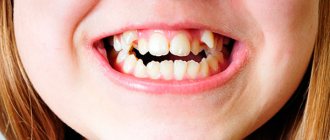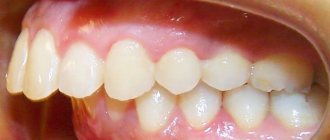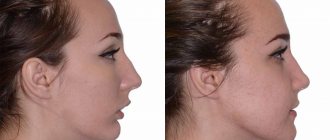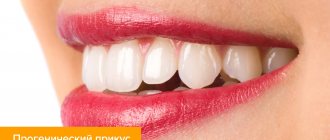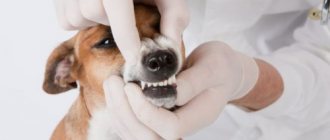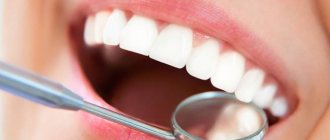Dental practice confirms that most people's bite is not ideal. Sometimes parents pay attention to this problem from the first years of a child’s life, children of less attentive parents turn to orthodontic treatment when they reach adulthood, while many, attributing the problem solely to aesthetic imperfections, prefer to ignore it altogether.
In fact, in addition to a visual defect, an incorrect bite can cause various dental problems, and often leads to permanent injury to the tongue and the inside of the cheek. This last inconvenience is very painful, and we will talk about it in this article, looking in detail at how to protect yourself from the problem, what to do if an injury has already been received, and what kind of bite is called incorrect.
What is “bad bite”
Bite (or occlusion) is the closing of the jaws at the moment of their natural compression. The standard is considered to be central occlusion, in which the number of points of contact between the teeth of the upper and lower jaws is maximum.
But all other options for interaction of the jaws when closing are malocclusions. Today it is customary to identify the main forms of malocclusion:
- open: there is no tight closure of the dentition
- cross: the antagonist teeth of the upper and lower jaws overlap each other with segments (in one area the lower ones overlap the upper ones, in the other - vice versa)
- mesial: the lower jaw protrudes forward, the upper teeth overlap the lower ones
- distal: the upper row of teeth is pushed forward, overlapping the lower one,
- deep: a type of distal bite when the upper jaw almost completely hides the lower teeth.
Contrary to the opinion of many people who believe that malocclusions are not a cause for concern, you should know: malocclusion of any form in most cases causes dental problems, and sometimes problems of a different nature.
The absence of several teeth and loose jaw closure can provoke:
- deterioration of the gastrointestinal tract;
- frequent headaches;
- development of facial asymmetry;
- premature appearance of facial wrinkles.
An incorrect primary bite can affect the growth of permanent teeth and lead to even greater deformation of the jaw system.
And very often, malocclusions cause permanent injury to the mucous membrane, including a strong bite of the tongue and the inner surface of the cheek. And the presence of open wounds in the oral cavity is a direct path to infection and the development of inflammation.
Don’t leave the problem unattended, contact your orthodontist on time!
Causes of tongue biting:
- A bad habit due to nervous tension. Essentially these are uncontrolled movements in stressful situations.
- Bruxism is excessive clenching of the jaws during sleep, during which the jaws move relative to each other and damage the soft tissues in the mouth.
- Malocclusion of teeth, usually due to misalignment of wisdom teeth. The characteristic sideways tilt or rotation changes the shape of the dental arch. This allows the cheek to fit into the gap as the jaws join.
- Poorly performed prosthetics disrupts the correct closure of teeth and makes it possible to capture the mucous membrane during chewing.
- The effect of anesthesia after the removal or filling of teeth is the lack of sensitivity of the cheeks and lips and their increase, which contributes to the biting of soft tissues and the formation of small wounds.
If such symptoms are detected, it is recommended to consult a dentist, who, in addition to examination, in some cases prescribes histological examinations. Sometimes a complete diagnosis also requires consultation with a neurologist.
Why does malocclusion form?
Statistics show that 90% of people have some signs of occlusion; The root cause of anomalies is considered to be genetics. However, heredity is far from the only factor.
According to orthodontic experts, the following factors influence the formation of the dentofacial apparatus in children:
- artificial feeding: when breastfeeding a newborn, the jaw apparatus is formed more correctly, while the habit of sucking a pacifier inherent in “artificial babies” affects the process negatively;
- difficulty changing teeth: loss of baby teeth too early or, conversely, with a delay can affect the health of the jaw apparatus;
- injuries, untreated caries, inflammatory gum diseases (all this is fraught with jaw displacement).
A child’s habit of sucking their thumb in their sleep can also lead to malocclusion in the future. But for adults, the greatest danger is the loss of teeth: the absence of even one unit in the dentition can lead to a violation of the load distribution, as a result - to deformation of the occlusion (this is another argument in favor of dental implantation, and the dentition must be restored as quickly as possible - before a problem such as malocclusion appears).
Why bite your tongue, the tip of your tongue, bite hard until you bleed: signs, meaning
Almost all unexpected actions have many signs associated with them. There are many beliefs around the tongue, lips and mouth. Many beliefs are associated with biting the tongue, cheek, and lip.
Signs about language:
- If you've been chewing and suddenly bite your tongue, maybe stop talking. Otherwise, you risk quarreling with your loved ones or friends.
- If you bite the tip of your tongue, this indicates a desire to lie. Therefore, try not to mislead your interlocutors.
- If you accidentally bite your tongue during a conversation, this means try to express yourself more softly. Otherwise, you risk quarreling with your interlocutors.
Why bite your tongue, the tip of your tongue, bite hard until you bleed: signs, meaning
First aid
If the tongue or the inside of the cheek is bitten, two problems arise at once:
1. Stop bleeding
solution: rinse your mouth with cold water, if possible, apply ice (cooling helps to constrict blood vessels)
If you cannot stop the bleeding on your own, you must immediately consult a doctor!
2. Pain relief
solution: cold also relieves pain, but if the pain is severe, treat the area with a special “freezing” spray or take a painkiller tablet
Consequences of untimely treatment of frequent tongue biting:
- Formation of a tuberculous ulcer (painful, uneven yellow ulcer);
- Development of leukoplakia (keratinization of the oral mucosa);
- Formation of a cancerous tumor (a compaction in the center of the ulcer that does not heal and can spread to neighboring areas of tissue).
Important! Under no circumstances should you wash open wounds with decoctions or solutions yourself - you risk not only aggravating the pain, but also causing an infection.
How to speed up wound healing
All wounds heal sooner or later - this is understandable, but the duration of healing largely depends on your actions. How to behave so that the injured mucous membrane heals as quickly as possible and without consequences? Some valuable tips for this case:
- pay increased attention to oral hygiene - this will help avoid infection of an open wound (regular brushing of teeth, careful removal of food debris and bacterial plaque);
- observe the temperature regime, avoid excessively hot or chilled foods for a while: cold is good only as an emergency measure, but subsequently it slows down the healing process; hot food and drinks both irritate and injure damaged tissues;
- use external antiseptics (sprays, ointments, lozenges): the pharmacist at the pharmacy will help you with the choice, ideally you should consult a doctor;
- rinse your mouth with decoctions of medicinal herbs: the best for these purposes are chamomile and St. John's wort;
- increase the proportion of foods with vitamins B and C in your diet, which promote wound healing; To heal scratches on the mucous membrane, use ascorbic acid.
Use the advice of traditional medicine with caution: rinsing with medicinal decoctions is not so harmless, you can resort to their help only with the permission of a doctor!
Why burn your tongue or the tip of your tongue: signs, meaning
It is believed that the tongue is burned for using foul language. There are several explanations.
Signs to burn your tongue:
- When a person swears or wishes evil, he creates a negative energy field around himself. Accordingly, bad words do not necessarily reach the person to whom they were intended. Therefore, a foul speaker often burns his tongue. This is a kind of warning not to throw around swear words.
- During pagan times, some swear words were considered part of spells, and therefore have a magical meaning. Swear words could only drive away evil spirits. Therefore, you can’t just use foul language. These are the machinations of evil spirits that are remembered.
Why burn your tongue or the tip of your tongue: signs, meaning
Radical solution to the problem
If cheek and tongue biting occurs regularly, the only way to get rid of the problem once and for all is to see a dentist. The specialist will examine the cause of the problem and, based on reality, will suggest:
- restoration of damaged teeth, removal of hopelessly damaged teeth, restoration of the correct distribution of chewing load through prosthetics or implantation;
- grinding of sharp edges of teeth that injure the mucous membrane;
- removal of wisdom teeth (if the dentition is displaced due to them);
- orthodontic treatment (plates, trainers, aligners, braces, etc.)
Main symptoms of cheek and tongue biting
Biting the cheeks or tongue during sleep or while eating is characterized by excessive pressure from the chewing teeth. Because of this, white abrasions first form on the mucous membranes in the mouth (something like a callus). Over time, wounds appear in their place, which bleed, take a long time to heal, and cause pain. As a result, it becomes uncomfortable to talk, brush your teeth, and even eat. When examined by a dentist, such severe damage to the soft tissues in the mouth is diagnosed as an inflammatory process.
Why bite the upper and lower lip, bite hard until it bleeds: signs, meaning
There are a lot of signs about lips:
- If you bit your lip during a conversation, it means you were trying to convey your point of view to your interlocutor. Perhaps you wanted to lie.
- If you were just sitting there minding your own business and accidentally bit your lip, be careful. Perhaps a quarrel awaits you soon.
- If the incident happened during a meal, you can kiss someone. Stock up on mints.
Why bite your upper and lower lips, bite hard until you bleed: signs, meaning
Lips, mouth, cheeks and tongue can say a lot. Listen to folk signs and try not to lie or use foul language.
Why bite the right and left cheek, bite hard until it bleeds: signs, meaning
Please note that this belief only works if you have had a leisurely lunch and are completely relaxed. If you were on a fruit diet for several weeks, and then, out of greed, you fell for pizza, then the belief does not work. The problem here is your sloppiness and haste.
Beliefs to bite your cheek:
- If you bite your cheek during lunch or dinner, expect passionate kisses.
- If your cheek is hurt during a conversation, then most likely the interlocutor wants to deceive you. Possible malicious intent.
- If you are confident in your interlocutor, then most likely you should remain silent so as not to quarrel.
- If you wake up in the morning and find that there is swelling on your cheek, then the fulfillment of your desires should be postponed until later.
- Sometimes people often bite their cheek not because of bad language, but because their taste is wrong.
Why bite the right and left cheek, bite hard until it bleeds: signs, meaning


